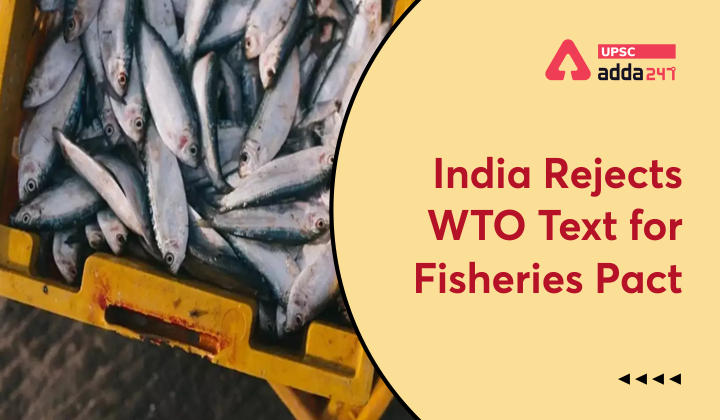Table of Contents
Relevance
- GS 2: Bilateral, regional and global groupings and agreements involving India and/or affecting India’s interests.
Context
- India has rejected the WTO draft text on curbing fishery subsidies as it was not responsive to the demands of the developing nations.
Key points
- India has rejected the draft for not adequately addressing its concerns on food security and livelihood of small fishers while including provisions that could help advanced countries perpetuate their huge doles for long-distance fishing.
Broad-Based Trade and Investment Agreement (BTIA)
India’s claim
- India is in favour of stopping IUU (illegal, unreported, unregulated) fishing and supporting sustainable fishing by checking harmful subsidies.
- However, the text is tilted heavily towards advanced fishing nations letting them maintain their subsidies for high-sea fishing.
- At the same time developing countries are denied adequate carve-outs that could hurt both livelihood and food security interests.
- India provides annual fishery subsidies of around $277 million while advanced fishing nations like China provide subsidies estimated at $7.2 billion, the EU at $3.8 billion, the US at $3.4 billion and Korea at $3.1 billion.
- Attempts are also being made to bring together like-minded countries sharing same concerns and similar stand as India.
3 categories
- In the on-going talks on curbing fishery subsidies, negotiations are taking place under three categories — IUU, over-fished (where stock is already declared as overfished) and over-fishing and over-capacity.
- The current text suggests that if a country can demonstrate conservation and management measures, it can continue fishing anywhere.
- As the standards are set by advanced fishing countries, it is easy for them to follow. Developing nations, on the other hand, may not be in a position to immediately show those standards.
Suggestions from India
- Advanced nations are engaged in distant water fishing beyond their Exclusive Economic Zone (EEZ) of 200 nautical miles, and are responsible for two-third of fisheries subsidies, which mostly goes to fuel. So, India suggested that advanced nations should stop such subsidies for 25 years.
- That left out space will be optimally utilised by developing countries and LDCs, to develop capacities and have policy space for meeting their food security needs.
- This proposal has been totally ignored in the WTO text.
- India had also sought carve-outs without disciplining commitments for fishing within territorial waters stretching up to 12 nautical miles as mostly marginal fishers operate in this zone who are too small to keep records and require all possible government support.
- However, the text gives a carve-out for territorial fishers only in the area of over-fishing and over-capacity, while giving just a two-year transition period for IUU fishing.
- For fishing within the EEZ (12 to 200 nautical miles), India had sought relief for seven years to put in place the required devices for appropriate management of fishing activities, but the draft does not provide for it.




 TSPSC Group 1 Question Paper 2024, Downl...
TSPSC Group 1 Question Paper 2024, Downl...
 TSPSC Group 1 Answer key 2024 Out, Downl...
TSPSC Group 1 Answer key 2024 Out, Downl...
 UPSC Prelims 2024 Question Paper, Downlo...
UPSC Prelims 2024 Question Paper, Downlo...
